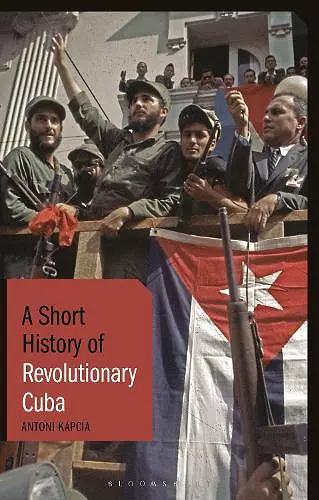A Short History of Revolutionary Cuba
Revolution, Power, Authority and the State from 1959 to the Present Day
Format:Paperback
Publisher:Bloomsbury Publishing PLC
Published:11th Feb '21
Should be back in stock very soon

A concise, engaging and accessible history of Cuban culture, society and politics in the revolutionary era. Kapcia authoritatively explores the ‘essence’ of the Cuban revolution, revealing it to be a maverick phenomenon tied not so much to socialism or Communism for their own sakes but instead to an idealistic vision of postcolonial nationalism. Reassessing the Cuban Missile Crisis of 1962, the author examines the central personalities: not just the famous trio of Che Guevara, Fidel and Raúl Castro in shaping the ideas of the revolution but, still further back, the visionary ideology of José Martí. Kapcia’s book reflects on the future of the revolution as Raúl and his government begin to cede power to a new generation.
Few island nations have stirred the soul like Cuba.Few island nations have stirred the soul like Cuba. From Hemingway’s intoxicating Havana to Ry Cooder’s Buena Vista Social Club, outsiders have persistently been fascinated by Cuba for its music (jazz to rumba), its rich literature, its art and dance (danzón to mambo) and perhaps above all for its bold experiment of a socialist revolution in action. Antoni Kapcia shows how the thaw in relations between Cuba and the USA now makes a fresh appraisal of the country and its modern history essential. He authoritatively explores the ‘essence’ of the Cuban revolution, revealing it to be a maverick phenomenon tied not so much to socialism or Communism for their own sakes but instead to an idealistic vision of postcolonial nationalism. Reassessing the Cuban Missile Crisis of 1962, the author examines the central personalities: not just the famous trio of Che Guevara, Fidel and Raúl Castro in shaping the ideas of the revolution but, still further back, the visionary ideology of José Martí. Kapcia’s book reflects on the future of the revolution as Raúl and his government begin to cede power to a new generation.
As with all the work that Antoni Kapcia has produced on Cuba “A Short History of the Cuban Revolution. Revolution, Power, Authority and the State” is excellent, superbly researched and highly nuanced in its approach. Kapcia both charts Cuban history from the colonial period, while also addressing the enduring nature of the Cuban Revolution. In doing this Kapcia contests many long-held assumptions concerning the Cuban Revolution and expertly examines the myriad of actors within the Cuban decision-making process with its vertical structures of power, participation and governance and horizontal processes of negotiation and consultation. Kapcia also examines the evolution of the word “revolution” within Cuba and its significance for Cuban history since January 1959. In sum, this work is essential reading for anyone with an interest in Cuba. * Mervyn Bain, Professor of International Relations, University of Aberdeen, UK *
ISBN: 9781788312165
Dimensions: 211mm x 137mm x 15mm
Weight: 320g
248 pages